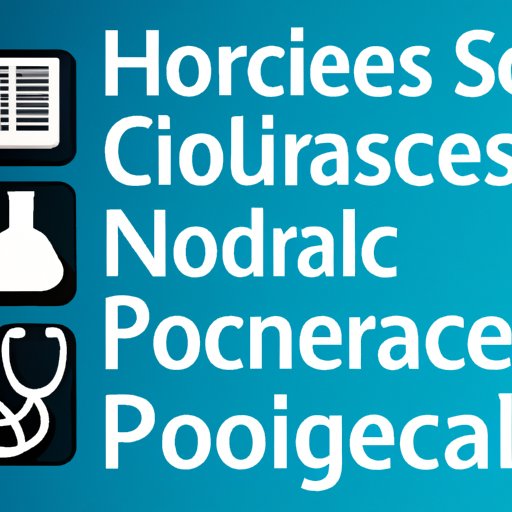Introduction
A health science degree is an academic degree that focuses on the scientific basis of health and wellness. It encompasses a broad range of disciplines, from biology and chemistry to psychology and public health. As such, a health science degree can open up many career opportunities for students, from clinical roles to research positions. In this article, we will explore what a health science degree can do and how it can benefit both individuals and the healthcare industry.

A Look at the Career Opportunities with a Health Science Degree
The career opportunities available to those with a health science degree are vast and varied. According to a study by the American Association of Colleges of Nursing, “nursing, medical technology, physical therapy, nutrition, and exercise physiology” are just some of the potential careers available to those with a health science degree. Other possible careers include laboratory technicians, radiographers, pharmacists, and dentists.
In addition to these traditional healthcare roles, there are also other non-clinical roles that require a health science degree. These include positions in public health, epidemiology, healthcare administration, and health policy. With a health science degree, you can also pursue a career in research, either in academia or in the private sector.
The benefits of pursuing a health science degree extend beyond the potential career opportunities. According to the Bureau of Labor Statistics, healthcare occupations are expected to grow by 14% by 2028, much faster than other industries. This means that health science degree holders have excellent job security and can expect to earn competitive salaries.
Exploring the Different Disciplines within Health Science
Health science is a broad field that incorporates many different disciplines. These include anatomy and physiology, biochemistry, epidemiology, nutrition, and psychology. Each discipline has its own unique set of skills and knowledge that can be applied to various careers in the healthcare industry.
For example, those who specialize in biochemistry can use their knowledge to develop new treatments and medications. Those specializing in epidemiology can help track the spread of diseases and design prevention strategies. And those specializing in psychology can work in mental health settings, helping patients cope with psychological issues.
By specializing in a certain discipline, health science degree holders can gain valuable skills and expertise that can help them stand out from the competition. Furthermore, they can tailor their degree to meet the needs of certain industries, such as pharmaceuticals or medical research.
Investigating the Skills and Knowledge Gained from a Health Science Degree
A health science degree provides students with a variety of skills and knowledge that are essential to success in the healthcare industry. On a technical level, students learn about anatomy and physiology, chemistry, biology, and pharmacology. They also learn how to interpret data, analyze research findings, and use technology to aid in their work. All of these skills are essential for working in a clinical setting or conducting research.
In addition to technical skills, health science degree holders also gain a variety of soft skills, such as communication, critical thinking, and problem-solving. These skills are essential for working in teams and providing patient care. Furthermore, health science degree holders develop an understanding of ethical and legal issues related to healthcare, which is important for any healthcare professional.

Examining the Impact of a Health Science Degree on the Healthcare Industry
The impact of a health science degree on the healthcare industry is significant. Health science degree holders bring a wealth of knowledge and experience to their roles, which can help hospitals, clinics, and other healthcare organizations run more efficiently and effectively. For example, health science degree holders can help create and implement new policies and procedures, as well as develop innovative treatments and therapies.
Furthermore, health science degree holders can contribute to the development of new technologies that can improve the quality of care. Additionally, they can help bridge the gap between research and practice, ensuring that the latest research findings are being used to inform clinical decisions.
Health science degree holders can also make an impact outside of the healthcare industry. For example, they can work in public health organizations, helping to develop strategies for improving public health outcomes. They can also work in government and policy organizations, helping to shape healthcare legislation and regulations.

Highlighting the Benefits of a Health Science Degree for Students
Finally, a health science degree can provide numerous benefits for students. On a financial level, health science degree holders can expect to earn competitive salaries, especially if they specialize in a certain discipline. Furthermore, many healthcare organizations offer tuition reimbursement programs, making it easier for students to pursue higher education.
On a professional level, health science degree holders can expect to gain valuable skills and experience. They will learn how to think critically, analyze data, and work in teams. Furthermore, they will gain an understanding of ethical and legal issues related to healthcare, which is invaluable in any healthcare setting.
Conclusion
In conclusion, a health science degree can open up many career opportunities and provide numerous benefits to students and the healthcare industry. With a health science degree, students can pursue a wide range of careers, from clinical roles to research positions. Furthermore, they can specialize in certain disciplines, such as biochemistry or epidemiology, and gain valuable skills and knowledge. Finally, health science degree holders can make an impact on the healthcare industry, helping to create new treatments and technologies and bridge the gap between research and practice.
In short, a health science degree can provide numerous financial and professional benefits. Therefore, it is an excellent option for those looking to pursue a career in healthcare.
(Note: Is this article not meeting your expectations? Do you have knowledge or insights to share? Unlock new opportunities and expand your reach by joining our authors team. Click Registration to join us and share your expertise with our readers.)
